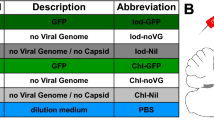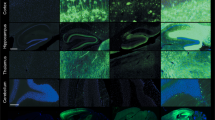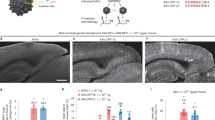Abstract
Adenovirus-mediated gene transfer has application to the treatment of diseases of the central nervous system. We demonstrate that a limitation to its use in vivo is an inability to redose to the brain. We show that one factor inhibiting re-dosing is the development of neutralizing anti-adenoviral antibodies. Encapsulation of recombinant adenovirus vectors in poly(lactic/glycolic acid) (PLGA) copolymer enables infection in vitro, in the presence of neutralizing antibodies and results in the release of viable virus for over 100 h. Importantly, encapsulated adenovirus also shows diminished immunogenicity in vivo. Mice immunized with encapsulated recombinant adenoviral vectors show a greater than 45-fold reduction in anti-adenovirus titers relative to non-encapsulated vectors. An extended release formulation of adenovirus that reduces viral immunogenicity and sequesters the viral particle form antibody exposure may improve in vivo efficacy.
This is a preview of subscription content, access via your institution
Access options
Subscribe to this journal
Receive 12 print issues and online access
$259.00 per year
only $21.58 per issue
Buy this article
- Purchase on Springer Link
- Instant access to full article PDF
Prices may be subject to local taxes which are calculated during checkout
Similar content being viewed by others
Author information
Authors and Affiliations
Rights and permissions
About this article
Cite this article
Beer, S., Matthews, C., Stein, C. et al. Poly (lactic-glycolic) acid copolymer encapsulation of recombinant adenovirus reduces immunogenicity in vivo. Gene Ther 5, 740–746 (1998). https://doi.org/10.1038/sj.gt.3300647
Received:
Accepted:
Published:
Issue Date:
DOI: https://doi.org/10.1038/sj.gt.3300647
Keywords
This article is cited by
-
Elastin-like polypeptide matrices for enhancing adeno-associated virus-mediated gene delivery to human neural stem cells
Gene Therapy (2012)
-
Engineering Biomaterial Systems to Enhance Viral Vector Gene Delivery
Molecular Therapy (2011)
-
Development of adenoviral vector-based mucosal vaccine against influenza
Journal of Molecular Medicine (2011)
-
PE38KDEL-loaded anti-HER2 nanoparticles inhibit breast tumor progression with reduced toxicity and immunogenicity
Breast Cancer Research and Treatment (2009)
-
Microencapsulation of PEGylated Adenovirus within PLGA Microspheres for Enhanced Stability and Gene Transfection Efficiency
Pharmaceutical Research (2007)



